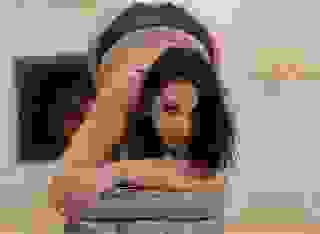- Romance
- Fiddler's Rest
Note: You can change font size, font face, and turn on dark mode by clicking the "A" icon tab in the Story Info Box.
You can temporarily switch back to a Classic Literotica® experience during our ongoing public Beta testing. Please consider leaving feedback on issues you experience or suggest improvements.
Click here"What is it? What's the matter, Meghan?"
"That's a strange question to ask right after we've returned from Sal's funeral," I answered.
"It's not Sal I'm asking about," Taylor answered. "Sal lived nearly a year longer than the doctor's gave him. He'd been reconciled with the inevitable and prepared for months."
No, Taylor was right. I didn't mourn Sal Singleton, my literary agent. I'd talked with him several times in the last two months. I knew that this was a release for him—that he had been more than ready to pass on. So why was I so melancholy? It hadn't really occurred to me that I was—certainly that anyone else could perceive that I was.
I was searching for an answer when Taylor distracted me with a flash of vermilion-red nail polish when she stood up and turned and leaned against the thin metal pillar between the two floor-to-ceiling windows of her office at Fabian Publishers. We were both left to our own thoughts momentarily as she gazed down seventeen floors to New York's Park Avenue. What I was thinking was how good Taylor looked in comparison to me. Her arm looked so thin as she raised it to her head and ran her fingers through her soft, but severely short, hair. She wasn't standing straight, but at a model's pose angle, all slimness and sharp angles in her tailored black business suit. I didn't hate her for it, but I resented the heck out of fate.
I suddenly felt decidedly large and frumpy in my crumpled dark-gray Palazzo pants and black jacket over a black knit shell. Of course it hadn't been fair that this was essentially the only outfit in somber colors I owned and that I'd gone straight to the funeral home after an early-morning flight up from New Orleans, where I'd been researching my next book.
I knew that pose; it was Taylor's "I have bad news to deliver" pose. And, so, I wasn't really surprised when she turned and picked up the manuscript—my latest submitted manuscript, the draft of my latest novel—and held it up with as few of her vermilion-tipped fingers as she could manage.
"I don't mean Sal. I mean your latest offering, Meghan. My heart skipped a beat when I read the title, 'Misery Creek,' but I'm afraid it went a little cold when I discovered that the title quite fairly described the storyline."
"Taylor—" I started to say. I'd dreaded this moment. I felt like I needed something new, something more serious and real—something not as shallow and happy go lucky as I had been writing. Something that didn't pretend. I was tired of writing about happy-go-lucky woman who were like me. It wasn't all that happy-go-lucky in real life.
"This isn't you, Meghan," Taylor broke in. "I've been your editor through five best-sellers, and this isn't the Meghan your readers want. You are the author of hope for young women. You write Romance—books that give hope to women who feel they are being overlooked by love. Romance has happy endings. So, again, I ask what is the matter? It can't be Sal. The change here isn't just a lack of optimism. It's something fundamental to romance. Tell me, Meghan, how is the young man you've been writing me about—Bill Hamilton? I would have thought he would have come up to the city with you."
Bingo. She had got it in one. She knew me better than I did. I hadn't let myself think of it to the depth she was, and I could not, in a million years tell her about it. Images of Bill on the front porch of his family's old Beaufort mansion that evening—the moss-covered southern colonial on the street named for his family in the oldest part of Beaufort, South Carolina, came to mind. I hadn't been expected. But I'd baked up several pans of blueberry muffins and then made the mistake of passing by a mirror—and suddenly I knew I wouldn't be eating these muffins and was trying to think of who would appreciate fresh muffins for their breakfast. That's how I found myself driving around the harbor from Fiddler's Cove to the old town.
They hadn't seen me through the heavy foliage between the porch and the street, and I withdrew—in shock and despair—as soon as I simultaneously heard and saw them—both nearly naked, he on top of her in the porch swing, her slim, white legs wrapped around the small of his back, the muscles of his buttocks expanding and contracting to the rhythm of her moans. I didn't realize then who she was, but I worked it out on the numb drive home. Sondra Laurens, the owner of Sondra's Grille on Bay Street, facing the harbor park, was a beauty—and so slim and trim. I didn't stand a chance against her. I probably never had.
I found through the pain of the memory, back to Taylor's office, where she was addressing the failings she saw in my book.
"The manuscript starts off fine, but somewhere here, about page 230, there's a change. But it can be fixed." Taylor, good old, model-thin, perceptive Taylor, had obviously realized she'd put her slender, vermilion-red thumb nail on the problem of my life and of my manuscript and had continued on, not pausing for me to tell her how frigging perceptive she'd been. She was so perceptive that she knew the precise page I was working on when I'd baked those blueberry muffins.
I looked on dully as she put the manuscript down and raised the trim black jacket from the back of her chair and began to put it on.
"Changes?" I asked. "Yes, yes, of course. I can do changes—but Sal . . . I'll need to start making arrangements on new representation."
"Oh, I don't see that you really need a literary agent anymore, Meghan," Taylor said with a breezy wave of her arm, as she moved around the desk, my manuscript now cradled in her arms. "You're part of the Fabian family now. We'll take care of you."
She leaned down to my chair and put an arm around me and patted me on the shoulder with her hand and gave me what passed from Taylor as an encouraging smile. Then she stood and moved to the door of her office.
"And now to lunch. I thought the Four Seasons—it's here in the Seagram's Building. And, of course, Fabian will pay. It's the least we can do for you being willing to drop by here when coming up for Sal's funeral on short notice."
We were eating a lunch—a far more fancy lunch than I was used to in my hidey hole writer's retreat in the low country bungalow on Fiddler's Creek, and I'd been a good girl and stuck with a shrimp salad—when Taylor looked up and I saw the iciness in her stare and heard it in her voice as she answered the greeting of the man who was gliding across the restaurant floor to our table.
"Hello, Taylor, you sleek panther. On the prowl again? And can this be a prospective lamb for you?" He barely brushed his hand by Taylor's, which seemed quite acceptable to her, and was sitting down next to me and turning all of his attention my way. It might have just been a designed ploy, but it worked a charm. I think I was lost to Donald Drake from the moment I saw him.
"Ah, no, it isn't. I actually look at those jacket photos," he said smoothly, trapping my eyes with his. I'd had time, though, to take in his handsome, tanned face and that marvelous gray-white shock of studiously unkempt hair. He was a large man, but in height and solidity rather than weight. A fawn-colored jacket and a subtle, expensive-looking tie. A beautiful smile married to a square jaw and laugh lines. He must have been twenty years my senior, but he wore his years very well.
"This can only be the elusive, intriguing Meghan Mason," he announced, using a tone that made me feel that all of the diners should be stopping their conversations and bowing to me in reverence.
"Laying it on a bit thick, aren't we, Donald?" Taylor said, her tone even icier than before, if that was possible. "And Sal Singleton barely in his grave. But yes," she continued with a heavy sigh, "This is Meghan Mason. Meghan, may I introduce Donald Drake. He's a literary agent to a legion of midlisters. You may certainly listen to his flowery compliments, but do not mistake what he is after." Although she looked at me hard when she said the word midlister, I would have gotten the derision in her warning and the distaste in her attitude just by the way she said it.
Drake didn't stay at the table long, but in the short time he was there, he was able to extract from me which hotel I was staying in and the fact that I didn't plan to return to South Carolina for another week or so—that I, in fact, still had some more work to do in New Orleans before I went home. And he did this so smoothly that it was only later that evening that I realized it had happened.
When we were finished with lunch, Taylor suggested that we return to her apartment at the Lexington rather than go back to the office and that we begin hashing over her suggestions for a redirection of the ending of "Misery Creek"—immediately starting a brainstorming session on a change of title, which she declared was just too, too dreary.
I have never had much of a head for liquor, and I didn't even ask what was in the drinks Taylor kept placing before me as we sat side by side on her settee in her postage stamp--sized living room and discussed the manuscript. It was only after I'd downed the third one and it was getting dark outside and I was having trouble focusing on the window where the lights of the building opposite were beginning to twinkle on one by one that I realized I was slightly tipsy. It was also at this point that I realized Taylor was sitting very close to me, very close indeed, and was smiling a wicked, vermilion-slashed smile and had a hand resting high on my thigh.
She laughed a throaty laugh as I extricated myself in as graceful a fashion as I could—which I'm sure was country-bumpkin clumsy to the sophisticated New York City stick model that was the senior Fabian editor Taylor Winthrop—and fled, embarrassed and confused, from her apartment.
When I entered my hotel room, the first things I saw were a bouquet of two-dozen yellow roses in a crystal vase and the blinking message light on my telephone.
Don Drake and I were married in the small chapel of a Manhattan church I couldn't find now if my life depended on it a little more than three weeks later. I knew even then that I was escaping from something rather than to something—but I didn't know if it was from the heart Bill Hamilton had broken back on the Beaufort mansion porch or the insinuation of what Taylor had implied when she moved close to me in her apartment—and that I hadn't found that nearly as repulsive as I should have.
* * * *
I don't know why I was so apprehensive about bringing my new husband home to Beaufort, but I was, and I put that off. After a whirlwind honeymoon in New Orleans, where we stayed for three week, with Don insisting that I finish my research on the next book, we returned to New York and stayed in his small apartment. But it didn't take very long until I couldn't take the noise and bustle of city life any longer and had to get back to where I could write. My own New York apartment was on a quiet side of the building on street well away from Central Park. But Don had to be closer to hustle and bustle, so I rented out my apartment and tried my best—unsuccessfully—to do my writing in his.
Taylor Winthrop had become cold to me and demanding for rewrites on a tight schedule when I had gotten married. Although I don't think it was the marriage that had hardened her as much as Don's insistence to take on my agent representation. Thinking back on it, I could readily see that Taylor was more interested in control and responding to Fabian's needs than in my interests and needs. I was happy, of course, that she had lost a more personal interest in me—but, even there, I couldn't help feeling like some door of opportunity had slammed shut on my life.
Don wasn't much help to me, either. He wanted the rewrites done as well, and he spent little time in the apartment, saying he was leaving me alone to complete the work. But this just made matters worse. We were nothing like the happy, mutually amoured newlyweds I wrote about in my books and I held in my imagination. The sex, even on the first night, had been perfunctory, and although Don said nice things to me, I felt a distance between us from the very beginning. I began to worry that he didn't want me in that way—that I somehow had not provided what he had expected. But I hadn't hidden anything from him. I wasn't any more the plus-sized woman on the up side of her twenty-fifth birthday now than when he had courted me so lavishly and attentively. I was beginning to feel self-conscious and unworthy—no, I was beginning to feel more self-conscious and unworthy than I had felt before my marriage—and this, combined with the distractions of the city, was playing havoc with my writing.
What I needed was my one unfailing, true love. I needed the steadfast part of my life that had cocooned me through best-seller after best-seller so that I now had no financial worries. I needed Fiddler's Rest.
Fiddler's Rest was my pride and joy, and the advance from my first best-seller had more than been swallowed up in buying it. And the bulk of my second, meatier, advance had gone into renovations.
I had visited Beaufort on a lark while traveling with a friend from Charleston, South Carolina, where we'd taken in the Spoleto music festival one spring, and Savannah, where I was looking for a location for a historical Romance I wanted to write. Julie had been one of my roommates in college. She was one of my steadier friends, and she'd come quickly to mind when I wanted to go on a sort of mutual "wipe him out of my system" open vacation down the southern Eastern seaboard.
Both Julie and I had been unceremoniously dumped by our respective boyfriends, left over from our college days, and, by mutual consent, we were drowning our sorrows in shared misery, ice cream, and mind-numbing activities we could pretend were developing our cultural sensibilities. Thus, we had subscribed to the city-wide musical and theater festival in Charleston and immersed ourselves in culture for a full week. From there, we were spending a week in a waterfront condo on Hilton Head Island, where we'd overload on more ice cream and self-pity, and then on to Savannah, where I had rented a small apartment on one of the squares the city was famous for on a three-month lease.
We weren't traveling just to forget the loss of male companionship—which in my case had never really blossomed into anything serious. I suspected that Julie had more to mourn in the department than I did. My boyfriend had ridden me so hard about my weight that by the time he told me he was moving on, I already had all of his things packed up and out on the doorstep in my mind. I was also on pins and needles about the "maybe" sale of a manuscript my literary agent, Sal Singleton, claimed he was about to land with a dream publisher. This was the third "maybe" for this manuscript, and I knew if I didn't get out of New York and do something to occupy my mind, I'd go crazy.
Julie and I had taken the route from Charleston and Hilton Head that ran through the little waterside town of Beaufort, South Carolina, a sleepy antebellum village that had been the venue of more than one major movie filmed with the south as a backdrop. We stopped there for lunch, which we reveled in on the back deck of one of the main street (in this case, Bay Street) restaurants overlooking the harbor wall and the town's marina. Pizza and wine. Sunshine and water. Sailboats and small fishing trawlers gliding in and out of the harbor created by the bend in the Beaufort River. And slow, gracious southern hospitality. So we were beyond mellow already when the call came through on my cell phone from Sal. Fiddler's Delight had been sold, and the advance, at least in my mind, was astronomical.
I was burbling my bonanza to Julie in unrestrained tones, when the waitress came by with our desserts. She had misheard what I was saying and said, "You needin' directions out to Fiddler's Rest, are you?"
"No, sorry," I answered. "Fiddler's Delight. That's what I was saying. It's the name of the book I just sold."
"Oh, sorry, honey," she said. "I thought maybe you were here to look at the old fiddler guy's house that's been for sale out on the cove."
Just a misheard phrase. That's all it was. But that's all it took. While we celebrated with double-decadence chocolate desserts, the coincidence of names rolled around in my head. I liked coincidences. I followed the lead of a coincidence whenever I could, and I was bothered by a sense of uncompleted business when we left Beaufort.
We drove on to Hilton Head with the old Mustang's top down under dappled sunlight glinting through the tree branches overhead on the sleepy coastal, but I couldn't forget the town of Beaufort and its connection to my good fortune. The thought kept surfacing that I usually didn't turn my back on coincidences. I believed in the power of coincidence, and in fate. I was an unredeemable romantic. I wrote historical Romances after all.
Julie and I had walked the town of Beaufort after lunch, and the more we moved away from the waterfront, the more we were lost in the history of old Victorian and antebellum mansions on quiet streets lined with old oaks dripping in Spanish moss. This was a town of my dreams, and from the first night in Hilton Head, Beaufort was what I dreamed about. In particular, I dreamed of a specific massive southern mansion we'd seen on Hamilton Street. As Julie and I had walked, we had bantered make-believe histories back and forth of the intriguing houses we passed—a little game we'd played in college and that had helped me to move into writing novels. In the story we wove about the house on Hamilton Street, it had been the first one built there, the original plantation house that had slowly developed toward the river into the town of Beaufort. When we had passed that house, I had caught only a glimpse of a handsome young man standing on the porch of the house, and Julie and I had incorporated him into our story as the handsome young man with a tragic secret. The image of the young man didn't fade from memory as the stories we wove did. Later, in Hilton Head, he was there in my dreams—and so was a concept of a house on the river, a house called Fiddler's Rest.
By Tuesday night, I couldn't take it anymore. On Wednesday I pushed a confused and mouthy Julie into my Mustang convertible and we were headed back to Beaufort. I'd looked up Fiddler's Rest on the Internet, so I knew exactly what Realtor to go to. I gulped at the asking price, but it was waterfront property, and my practical side, such as it was, had assumed it would be more. My advance, added to what I thought I could get from my postage-sized apartment in New York in a depressed economy, would just about cover it.
The house itself was a big disappointment—at least from the outside. It was on a longish dirt and gravel drive off route 802 running south out of Beaufort and through the Port Royal Peninsula toward the remote Marine training base at Parris Island. The house was isolated and almost right up against a bend in the Beaufort River, looking back at the Beaufort waterfront. An unkempt lawn surrounding the house ended on two sides as a marshy fringe on the river and on the other two sides in sand-based scrub and straggly pines running back inland to and masking the main road. It was an old, squat, rectangular bungalow, sitting a couple of feet off the mossy ground on cinderblocks. The front porch was rickety, and my first thought was that it would have to be taken off the house by the next owner.
The main structure was sheathed in old weather-beaten wooden siding that once had been white, and it had a rusting copper-green metal hip roof. The short side of the house faced the circular drive, with the longest side of the house, represented by a rusted and torn-screened porch, running the whole length of the house and facing north on the river.








